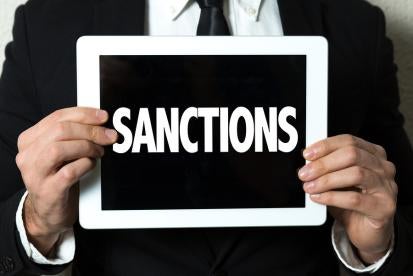The UK’s sanctions monitor, the Office of Financial Sanctions Implementation (OFSI), has issued its biggest fine to date, imposing a total financial penalty of approximately £20.47 million on Standard Chartered Bank for breaches of EU and UK sanctions in relation to Ukraine.
The fine, which was imposed after review by John Glen, Economic Secretary to the Treasury, represents a significant increase on OFSI’s previous (and at that point largest) financial penalty of £146,341, issued against Telia Carrier UK Limited (Telia), for having ‘indirectly facilitated international telephone calls’ to a sanctioned Syrian entity (see GT Alert, OFSI Finds Its Teeth While OFAC Continues to Enforce Against Non-U.S. Corporates).
In this GT Alert, we outline what led OFSI to impose a fine on Standard Chartered, how the fine was treated on review, and what the implications are for sanctions enforcement in the UK.
The Facts
Standard Chartered made a number of loans to a Denizbank A.S. between April 2015 and January 2018. At the time the loans were made, Denizbank was a majority owned subsidiary of the Russian Sberbank, which was subject to sanctions under the EU’s Ukraine (Sovereignty and Territorial Integrity) regime. This regime, imposed in July 2014, contained measures including the prohibition of making loans or credit available to any sanctioned entities.
As noted in our previous GT Alert, while the EU sanction itself has direct effect in EU member states, the enforcement of sanctions, including the setting of penalties and issuance of guidance, is left to each Member State. In the UK, it is OFSI that monitors, administers and enforces such sanctions. OFSI also issues guidance on the operation of sanctions in the UK. Penalties for violations are set out in both primary and secondary legislation.
In the Standard Chartered case, the EU’s regime is crystallised in the Ukraine (European Union Financial Sanctions) (No 3) Regulations 2014. Following a self-report by the bank, OFSI decided that 70 of the 102 loans with an estimated value of £266 million were in breach of sanctions regulations. However, because only 21 of the loans were made after the Policing and Crime Act 2017 (PACA 2017) came into force, OFSI had no power under that Act to penalise the remaining 49.
In assessing these breaches OFSI considered that, although Standard Bank was aware of the sanctions regime and the need to take compliance steps, the dispensations introduced by Standard Bank which enabled loans to be made where it considered an exemption was applicable had not been “appropriately put in place, and the subsequent operations of the dispensations enabled loans to be made which were not within any exemption and therefore were in breach of the EU Regulation.”
The Calculation
The 21 loans had a transaction value of £97.4 million; it was these loans for which OFSI issued an original total penalty amount of £30.5 million. OFSI determined that the loans were a ‘most serious’ breach of the sanctions; accordingly, pursuant to OFSI’s guidance on monetary penalties, Standard Chartered could only receive a reduction of up to 30% to the ‘baseline penalty’ for voluntarily disclosing the breaches.
The ‘baseline penalty’ is calculated by taking the statutory maximum (the greater of £1 million or 50% of the value of the breach) before deciding what level of penalty is reasonable and proportionate based on an assessment of seriousness. Breaches considered ‘serious’ may lead to discounts of up to 50%.
OFSI’s published report makes clear that when calculating the original penalty, OFSI had reduced the total penalty amount by 30% to take into account the fact that the bank had:
‘…disclosed the suspected breaches…carried out an internal investigation…provided a detailed report…to OFSI as well as interim updates, and cooperated with OFSI’s investigation.’
The reduction, OFSI states, was applied ‘following the process set out in [its] published guidance on case assessment’.
The Review
Nevertheless, Standard Chartered exercised its right to request a review by a government minister, under PACA 2017 Section 147, which states that if a review is requested, the reviewing minister may:
a) Uphold the decision to impose the penalty and its amount,
b) Uphold the decision to impose the penalty but substitute a different amount, or
c) Cancel the decision to impose the penalty.
While Mr Glen agreed that there had been a most serious breach of financial sanctions he upheld OFSI’s decision to impose the penalty on the basis that the bank had not wilfully breached the regime, had acted in good faith, had intended to comply with the relevant restrictions, had cooperated fully and had taken remedial steps following the breach. He also found that although OFSI had considered these factors when conducting its assessment, the factors had not been given enough weight when the original penalty was calculated. The penalty amounts were therefore reduced significantly.
The Outlook
After the Telia case in 2019 and in the wake of Brexit, the UK was vocal about implementing its own sanctions regime, either under the Sanctions and Money Laundering Act 2018 (SAMLA 2018) or via a new statutory regime. This included assertions made by Foreign Secretary Dominic Raab that the UK would enact its own ‘Magnitsky Law’ to sanction those responsible for human rights abuses.
Both the Telia case and Brexit may signal a more aggressive approach by OFSI, which may be taking inspiration from OFAC, its U.S. counterpart; in 2019 alone OFAC imposed approximately $1.3 billion worth of sanctions penalties.
OFSI’s approach in the Standard Chartered case shows that even if breaches are self-reported, those who report them may still face an uphill battle in attempting to secure maximum credit and the most favourable outcome, even when displaying obvious and extensive cooperation.
In this case Standard Chartered chose not to appeal the decision in the Upper Tribunal, as it had a right to do under PACA 2017 Section 147 (6); however, should OFSI continue to take an aggressive approach to enforcement and penalty calculation, it may not be long until we see such an appeal even in cases where penalty amounts are reduced on review.
In any case, companies should consider addressing the issues presented by sanctions compliance, ensuring that they are aware of and fully understand the sanctions in place. OFSI publish a consolidated list which will assist companies to identify the targets of the financial sanctions in place, and companies can also subscribe to updates from OFSI in respect of changes to those sanctions. Companies should also conduct periodic sanctions risk assessments of their business and implement appropriately tailored risk-based compliance programs with appropriate financial sanctions screening or checks. Those that have uncovered a potential sanctions violation within the business which may require the submission of a report to OFAC or OFSI should seek legal advice immediately.





 i
i


